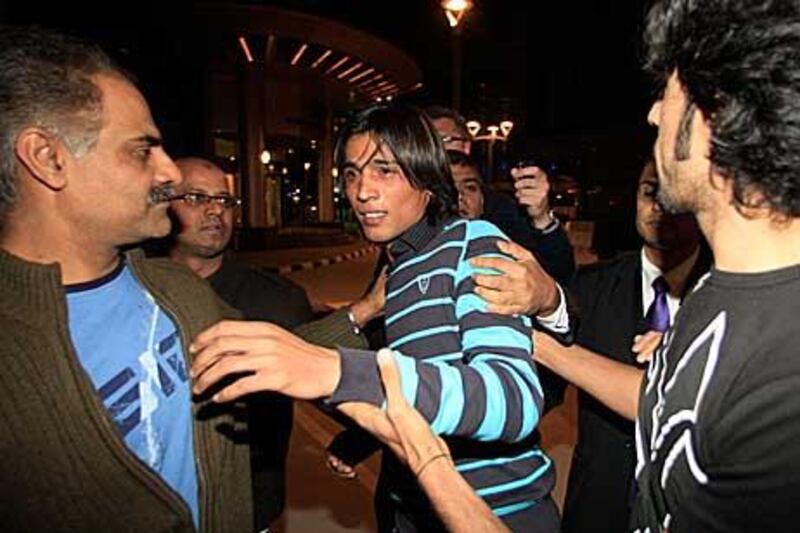For the first time since he started his luminous ascent in international cricket at age 16, then followed it hastily with a tumultuous crash, Mohammad Aamer looked his age last night.
Around 50 Pakistani cricket fans had gathered at the foot of the Qatar Financial Centre's Al Alawi Tower for a glimpse of the three players who had just been found guilty of manipulating cricket matches for their own financial gain.
First, the crowd were presented with departing members of the three-man commission who had just passed down the sanction of a five-year ban to Aamer, 18, with more stringent penalties for his senior colleagues, Salman Butt and Mohammad Asif.
As Justice Albie Sachs, the South African member of the International Cricket Council (ICC) tribunal committee, made his way to his waiting chauffeur-driven transport, he was jeered by the mob.
The baying was not with any great malice, though. They maintained a polite distance, and instead quickly broke into a rendition of "Long live Pakistan!".
Soon it was the turn of the skeletal figure of Aamer to run the gauntlet. He looked gaunt and timid, doing his best to hide his face behind his long, wilting hair.
The throng advanced and the security staff were unable to cope. Aamer cowered under the arm of a huge Pakistani, whose turban looked like it must weigh more than the bowling prodigy himself. He clutched Aamer to one side of his chest. On the other a Pakistan rosette flickered in the light of flashbulbs.
All through this furore, Aamer's demeanour has been that of a happy child who has yet to fully comprehend the extent of the trouble he was in. The day before yesterday's final verdict, he had laughed freely as he told an Urdu news channel he was optimistic of his chances.
Now the penny has dropped, and it will be more costly than any of the unexplained dropped catches in the murky past of Pakistan cricket.
The sport's brightest young talent will now be lost to the game for five years. Since these three players were first provisionally suspended pending this investigation a little over five months ago, sympathy has been in short supply for Butt and Asif, the other two sinners. If they never make it back their absence will not be mourned by many.
Yet Aamer, a teen from a poor family who often had to evade Taliban ambushes to get to training as a junior, has overwhelmingly been regarded as a victim of the murky world of corruption in cricket.
His lawyer, Shahid Karim, suggested the tribunal had signalled that they felt the ICC should amend the minimum punishment of five years, most likely because of cases like Aamer's.
"For us, the silver lining in all this is that the tribunal's decision contains a direction to the ICC to amend the code suitably for the tribunal to exercise its discretion to lower the sanction below the minimum prescribed," Karim said.
"In all of this, the tribunal's hands were tied in an offence like this one. He is very young and at the age of 23 he will be able to make a comeback."
The lawyer added that Aamer remains close to his former Pakistan teammates, and continued to protest his innocence.
Aamer's youth contrasted wildly with the archaic language of legalese employed as the sanctions were announced by Michael Beloff, the chairman of the tribunal.
"The tribunal found that the charges under Article 2.1.1 of the Code that [respectively] Mr Asif agreed to bowl and did bowl a deliberate no ball in the Lord's Test match played between Pakistan and England from 26 to 29 August 2010, Mr Aamer agreed to bowl and did bowl two deliberate no balls in the same Test, and Mr Butt was party to the bowling of those deliberate no balls, were proved," Beloff said as he read out the verdicts.
Early in the day, the tribunal told the players they would not defer the case again, despite the announcement that the Criminal Prosecution Service in the United Kingdom would be bringing a case against them.
They have been summoned to court next month to answer charges of conspiracy to obtain and accept corrupt payments and conspiracy to cheat.
Having now found the players guilty, the ICC will today decide whether or not to make the details of the investigation public. It seems unlikely, as the findings could prejudice the criminal case in the UK.
"The tribunal note that it is for the ICC, whether and if so when, the fully reasoned decision in respect of the breaches of the Code and of the sanctions imposed in consequence should be published," Beloff said.
"It is our strong and unanimous view that it is in the interests of all concerned in the world of cricket that publication should take place as soon as possible."
pradley@thenational.ae
ALSO: Five tainted cricketers
Young Aamer receives public sympathy after ban
The teen from a poor family, who often had to evade Taliban ambushes to get to training as a junior, has been regarded as a victim of the murky world of corruption in cricket.

Editor's picks
More from the national





